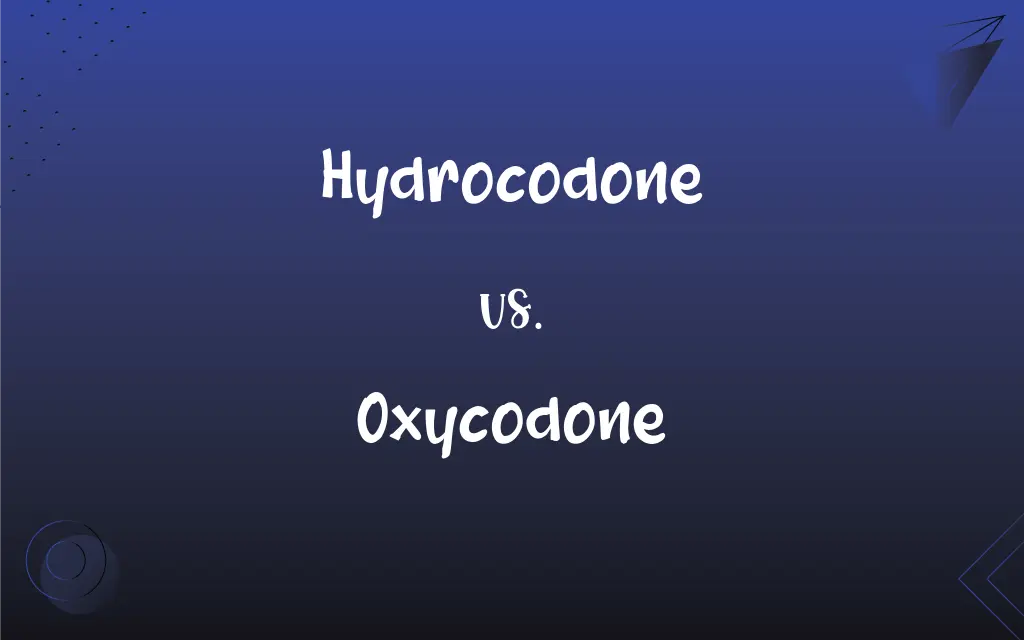Hydrocodone vs. Oxycodone: What's the Difference?
Edited by Aimie Carlson || By Harlon Moss || Updated on October 27, 2023
Hydrocodone and oxycodone are both prescription opioids, but hydrocodone is often combined with acetaminophen, while oxycodone can be found alone or in combination with other medications.

Key Differences
Hydrocodone and oxycodone are two potent prescription pain relievers classified as opioids. While both are derived from the opium poppy and serve similar purposes in pain management, their chemical structures differ slightly, affecting their pharmacodynamics.
Hydrocodone is commonly prescribed in combination with other non-opioid pain relievers, particularly acetaminophen. This combination enhances pain relief but also limits the intake of hydrocodone, as excessive acetaminophen can be harmful. On the contrary, oxycodone is often available as a standalone drug, though it's sometimes combined with other medications like acetaminophen or aspirin.
In terms of potency, both hydrocodone and oxycodone are powerful opioids, but their effects can vary based on dosage, individual physiology, and the presence of other medications. While some patients may find relief with hydrocodone, others might prefer oxycodone due to its slightly different effect or tolerance levels.
Another noteworthy distinction between hydrocodone and oxycodone lies in their formulations. Hydrocodone is often found in extended-release forms, designed for prolonged pain relief over several hours. Meanwhile, oxycodone comes in both immediate-release and extended-release versions, catering to varying pain management needs.
Lastly, both hydrocodone and oxycodone carry risks of addiction and overdose, as is the case with most opioids. It's vital for healthcare providers to monitor patients closely, ensure appropriate dosages, and educate on the potential dangers and side effects of both drugs.
ADVERTISEMENT
Comparison Chart
Common Combinations
Typically with acetaminophen
Alone or with other medications like acetaminophen
Chemical Structure
Slightly different from oxycodone
Slightly different from hydrocodone
Formulations Available
Mainly extended-release
Immediate-release and extended-release
Potency
Powerful opioid, effectiveness varies among individuals
Often deemed slightly stronger than hydrocodone
Risks
Addiction, overdose, side effects with acetaminophen
Addiction, overdose, potential side effects
ADVERTISEMENT
Hydrocodone and Oxycodone Definitions
Hydrocodone
A narcotic derived from codeine and thebaine.
Hydrocodone acts on the central nervous system to provide relief.
Oxycodone
A potent opioid pain reliever.
Oxycodone was prescribed to manage severe back pain.
Hydrocodone
Often combined with acetaminophen in medications.
Many patients take hydrocodone-acetaminophen combinations for chronic pain.
Oxycodone
Available in immediate and extended-release forms.
Patients can take immediate-release oxycodone for sudden pain spikes.
Hydrocodone
A controlled substance due to addiction potential.
Misuse of hydrocodone can lead to dependency and health issues.
Oxycodone
Derived from the opium poppy, related to codeine and morphine.
Oxycodone is often chosen when over-the-counter painkillers are ineffective.
Hydrocodone
An opioid analgesic used for pain management.
The doctor prescribed hydrocodone to alleviate post-surgery pain.
Oxycodone
Sometimes combined with other medications for enhanced relief.
Oxycodone-acetaminophen tablets are commonly prescribed post-operatively.
Hydrocodone
Extended-release tablets for prolonged relief.
Hydrocodone's extended-release formulation ensures steady pain control.
Oxycodone
A controlled substance with a high risk of addiction.
Long-term use of oxycodone can lead to physical dependence.
Hydrocodone
A narcotic drug derived from codeine, C18H21NO3, used in its bitartrate form as an analgesic and antitussive.
Oxycodone
A semisynthetic opioid drug, C18H21NO4, used in its hydrochloride form as a pain reliever, often in combination with nonopioid analgesics such as acetaminophen.
Hydrocodone
(pharmaceutical drug) A habit-forming compound that is derived from codeine and is administered in the form of its bitartrate C18H21NO3·C4H6O6 usually in combination with other drugs (as acetaminophen) as an analgesic or antitussive.
Oxycodone
(pharmaceutical drug) A synthetic analgesic drug (trademark OxyContin) that is similar to morphine in its effects.
FAQs
What is hydrocodone used for?
Hydrocodone is used primarily for pain management.
What are common side effects of oxycodone?
Side effects include drowsiness, dizziness, nausea, and constipation.
Can I take oxycodone with alcohol?
Combining oxycodone with alcohol can be dangerous and is not advised.
Is oxycodone suitable for long-term use?
It can be used long-term but with caution due to addiction risks.
What's the typical dosage of hydrocodone?
Dosage varies based on pain severity and patient tolerance.
What happens in a hydrocodone overdose?
Overdose can cause slowed breathing, unconsciousness, or even death.
Is oxycodone stronger than hydrocodone?
Oxycodone is often deemed slightly stronger, but effectiveness varies among individuals.
Can hydrocodone impair driving?
Yes, hydrocodone can cause drowsiness and impair cognitive function.
Can hydrocodone cause respiratory depression?
Yes, high doses can lead to breathing difficulties.
How can one prevent addiction to oxycodone?
Regular monitoring, taking as prescribed, and frequent doctor consultations can help.
Can hydrocodone cause addiction?
Yes, hydrocodone has a potential for addiction and misuse.
Is hydrocodone always combined with other drugs?
It's commonly combined with acetaminophen, but pure formulations exist.
Is oxycodone safe during pregnancy?
It's best to consult a doctor, but it's generally avoided due to potential risks.
Is hydrocodone available over-the-counter?
No, it's a controlled substance and requires a prescription.
How often should oxycodone be taken?
It depends on the formulation and doctor's advice.
Can oxycodone be crushed?
Crushing can release all medication at once, which can be dangerous.
Are there non-opioid alternatives to hydrocodone?
Yes, there are non-opioid pain relievers available.
How is oxycodone metabolized?
Oxycodone is metabolized in the liver and excreted via the kidneys.
How quickly does oxycodone act?
Immediate-release formulations act within 10-30 minutes.
How should hydrocodone be stored?
Store in a cool, dry place away from children.
About Author
Written by
Harlon MossHarlon is a seasoned quality moderator and accomplished content writer for Difference Wiki. An alumnus of the prestigious University of California, he earned his degree in Computer Science. Leveraging his academic background, Harlon brings a meticulous and informed perspective to his work, ensuring content accuracy and excellence.
Edited by
Aimie CarlsonAimie Carlson, holding a master's degree in English literature, is a fervent English language enthusiast. She lends her writing talents to Difference Wiki, a prominent website that specializes in comparisons, offering readers insightful analyses that both captivate and inform.































































